Archive
19 January 2024
Giga-sized nuclide chart
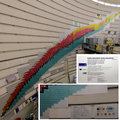
TU Delft Reactor Institute's, part of TU Delft Applied Sciences’ research reactor got a new exterior a few years ago. What cannot be seen from the outside: the inside has now also received a unique covering: the nuclide chart.
17 January 2024
QphoX raises €8m to bring quantum modem technology to market, building towards the quantum internet
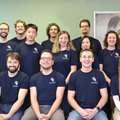
Dutch quantum computing company QphoX has raised an €8 million funding round, the largest investment in a quantum company in the Netherlands to date, in a significant development for the country’s fast-growing quantum industry.
11 January 2024
How living materials from algae can best capture carbon
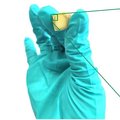
Scientists from TU Delft have found how confined microalgal cells grow optimally in photosynthetic engineered living materials. With the use of light energy, the microalgae convert CO2 from the air into sugars, energy and oxygen for their survival. Such algae-based living materials could be used in a range of applications, from functional objects for CO2 capture, to oxygen sources for biological tissues. The team, led by Marie-Eve Aubin-Tam and Kunal Masania, present their new insights in Advanced Materials.
10 January 2024
James Byng wins TNW Excellence Award
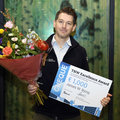
James Byng, director of the TU Delft Hortus Botanicus wins TNW Excellence Award. His ambition was “to create within five years a garden that will be a leading visitor attraction for the city of Delft and the leading technical botanical garden in Europe.” He is already very far along in achieving this ambition. The TNW Excellence Award is an award for a faculty member, in management and organisation, who has shown exceptional commitment within the TNW faculty.
10 January 2024
Wim Bouwman receives J. B. Westerdijkprize 2024
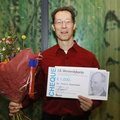
During the New Year's breakfast 2024 of the Faculty of Applied Sciences, Dr. Wim Bouwman (Radiation Science and Technology) was awarded the prestigious J.B. Westerdijk Prize. He received the prize for his exceptional contributions to education.
14 December 2023
TU Delft Applied Sciences Graduates of the Year 2022-2023
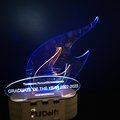
Damián Vico van Berkel, Tess Bevers, Vincent Kruit, Sybe Adringa, and Francesco Zatelli, each of whom has graduated from the various Applied Sciences Master’s programmes, have been recognised as Graduates of the Year 2022-2023 in Applied Sciences. Recognising and encouraging talent is extremely important to the faculty, which believes students who show exceptional development deserve to be placed in the spotlight and rewarded for their outstanding efforts. Below, you can read about their career paths, which will serve to inspire current and prospective students.
12 December 2023
Korean Delegation: Strengthening Global Bonds in Science and Technology
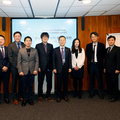
In an exciting stride toward international collaboration, TU Delft was honoured to host the Minister of Science and ICT (MSIT) in Korea, Jong Ho Lee, and the President of the Korea Institute for Advancement of Technology (KIAT), Byungjoo Min, at TU Delft,
28 November 2023
NWO grant for size-tuneable nanopores and living building materials
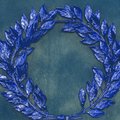
The Dutch Research Council (NWO) has awarded grants to 28 promising research projects in the field of Exact and Natural Sciences (ENW), including two at the Faculty of Applied Sciences at Delft University of Technology. The grants of up to 50,000 euros are part of the Open Competition ENW-XS. Eva Bertosin receives the grant for her work on nanopores and Kui Yu is awarded for his research on living building materials.
27 November 2023
Students receive KHMW Young Talent Graduation and Incentive Prize
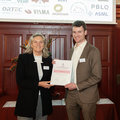
On Monday 27 November, 67 incentive prizes were presented to first-year students and 20 graduation prizes to master's students by the Royal Holland Society of Sciences and Humanities (KHMW). Twelve TU Delft students were granted such awards, including four from the Faculty of Applied Sciences.
15 November 2023
More efficient electrodes for CO2 recycling
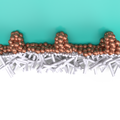
CO2 electrolysis is a promising way to store energy whilst recycling carbon dioxide. By applying electricity, CO2 and water react and produce more complex molecules. A study published in Nature Communications lead by Hugo van Montfort at TU Delft has presented a new design of electrodes that improves the efficiency of CO2 electrolysis.